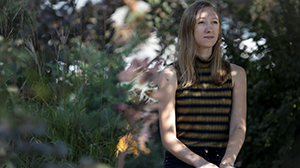- Future Students
- Current Students
- Faculty
- Staff
- Alumni
- Others
UofGH’s Dr. Adam Sandford and alum Skylar Rego publish research in “Perception” journal

University of Guelph-Humber Psychology alumna Skylar Rego and Dr. Adam Sandford, Assistant Program Head of Psychology at UofGH, recently published their research in the peer-reviewed journal, "Perception."
Rego is credited as a co-author on the journal article titled “Recognition of Deformed Familiar Faces: Contrast Negation and Nonglobal Stretching.” Rego worked as a research assistant on the study led by Dr. Adam Sandford, which focused on facial recognition and how face-shape configuration supports the recognition of faces. For the study, participants viewed a series of famous faces, which were manipulated with a series of distortions and photographic configurations to see if it influenced facial recognition.
For the journal article, Rego did an extensive literature review, and was involved with writing up their final findings. She says contributing to a peer-reviewed journal was a highlight of her time at UofGH. “Seeing all that hard work come together and having such big results, it felt really good,” says Rego. “I was really proud of myself and the work we did. And seeing my name on a peer-reviewed journal article was a little surreal – it didn’t seem like something that would happen, especially at the undergraduate level, and it was definitely one of the best experiences I had over my undergraduate career.”
She also helped to coordinate the participants, conducted data analysis, and presented the findings from the study earlier this year at the 29th annual Canadian Society for Brain, Behaviour, and Cognitive Science Conference, held at the University of Waterloo. “The best thing about this experience was being able to contribute to this project in so many ways,” says Rego. “I enjoyed working with participants, and also being able to contribute my own ideas and work to the final write-up. I got to learn about a topic of psychology I wasn't really aware of, and was able to utilize this new knowledge for our project. Dr. Sandford provided a lot of opportunities to be involved in the project from beginning to end, so I was able to learn about all of the steps involved.”
Gaining research experience
Rego landed the research assistant role through UofGH’s Research Grant Fund, which gives students opportunities to work as paid research assistants with instructors who receive funding for their research. Rego began working with Dr. Sandford during her second and third years, when she volunteered to be a participant in a couple of his studies. Interested in his research, and wanting to learn more from the researcher perspective, she applied for the research assistant role in her fourth year.
“I got a lot out of being a research assistant – I learned a lot about a different side of psychology, the research side of it. I gained so many valuable skills when it comes to research and academics,” Rego says. “I built my interpersonal skills by working with research participants, but I also developed my writing and critical thinking skills.”
“I was very impressed with Skylar. She is a student who has done a lot for UofGH, and has been a great ambassador for the Psychology program and the university,” says Dr. Sandford. “She played an important part throughout the project. She’s been a very strong research assistant, and has been an important part of the process. It would have taken a lot longer without her assistance.”
Dr. Sandford says that undergraduate students typically don’t have the opportunity to go through the process of publishing in an academic journal, but the Guelph-Humber Research Grant Fund makes this a possibility. “Because we’re an exclusively undergraduate institution, we can afford our students these opportunities,” says Dr. Sandford. “Although the experience for every student is different, Skylar was fortunate to get the exposure to that process that she can take forward to the graduate level, and would make her stand out in her graduate applications.”
Rego says research opportunities allow students to learn about the field of study within psychology, use skills they have learned in the classroom, and build skills they can take forward to graduate school. She hopes to pursue a Master’s degree in Clinical Psychology, and is planning to apply to graduate schools. “It allows students to gain experience and more skills at an undergraduate level that they will be able to utilize in graduate school and possibly their future careers,” she says. “Research is a big aspect of most psychology graduate programs, so being able to have experience before you go into graduate school is really important and beneficial.”
Dr. Sandford says that research assistant opportunities are one way for students to set themselves apart, but he encourages students to get involved on campus however they can. “The research assistant position is something I strongly advocate for, but it goes beyond research,” he says. “Students can set themselves apart in other ways. Students can set themselves apart by volunteering on campus, and participating in research studies. As a participant, you’ll still get some insight into what people are investigating, and the research questions being asked. There are many opportunities for students on campus to bear in mind.”
“I highly encourage students to apply for research positions around the school,” says Rego. “Research is completely different from the clinical side of psychology. I think it is beneficial to gain some experience in this field to be able to see if it is something you could be interested in, and to branch out to new areas.”







